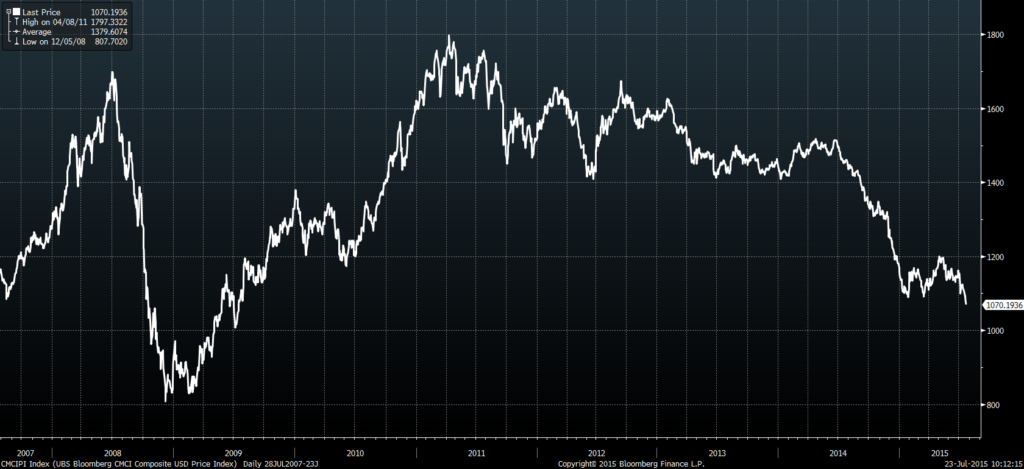-
-
-
![Michael Rosen]()
-
CIO Insights are written by Angeles' CIO Michael Rosen
Michael has more than 35 years experience as an institutional portfolio manager, investment strategist, trader and academic.
RSS: CIO Blog | All Media
Plunging
Published: 07-24-2015Commodity prices are in free fall. The Bloomberg Commodity Price Index (5-year chart below) is off about 30% in the last year. Gold is dropping toward $1,000/oz., and oil (WTI) is back below $50/barrel.
A hundred years, Nikolai Kondratiev proposed his wave theory of capital markets, and 50 years ago Benoit Mandelbrot observed the fractal nature of these waves, their similarity over multiple time frames. When two waves of different frequencies but similar magnitudes collide, the result is a much-amplified force.
That, I think, is what we are seeing in commodity prices. Commodity prices have historically moved in long waves, super-cycles, lasting decades. Typically, ten years of soaring prices are followed by two decades of falling prices, and the cycle is then repeated. In recent memory (for some of us), commodity prices soared in the 1970s, then fell through most of the 1980s and 1990s. Prices jumped again in the last decade, and are now in a period of decline that I suspect will last another 10-15 years. Of course, within these long cycles are periods of reversal, but they don’t alter the long-term trend. At other times, the long-term trend is reinforced by short-term factors, resulting in sharp moves, amplified by the confluence of these two waves.
The proximate cause today of both waves, long-term and short-term, is China. The world’s second-largest economy accounts for nearly half of the global consumption of major commodities. Demand changes in China at the margin have enormous, and immediate, impact on prices.
So the recent drop in commodity prices tells me that the Chinese economy, notwithstanding official statistics showing 7.5% real GDP growth, is weaker than we think.
Print this ArticleRelated Articles
-
![(Not) Recommended Reading]() 20 Dec, 2017
20 Dec, 2017(Not) Recommended Reading
I dont like recommended lists. They turn experiences into a contest (and the winner is), and one reviewers preferences ...
-
![Two (Percent) is a Sad Number]() 21 Sep, 2020
21 Sep, 2020Two (Percent) is a Sad Number
Last month, the Federal Reserve unveiled its new monetary framework, following an intensive 18-month review. The ...
-
![Whats Down With Oil?]() 15 Apr, 2020
15 Apr, 2020Whats Down With Oil?
I have always found that most things in life can be explained by basic economics. Well, some things, for sure. The most ...
-





